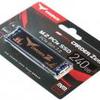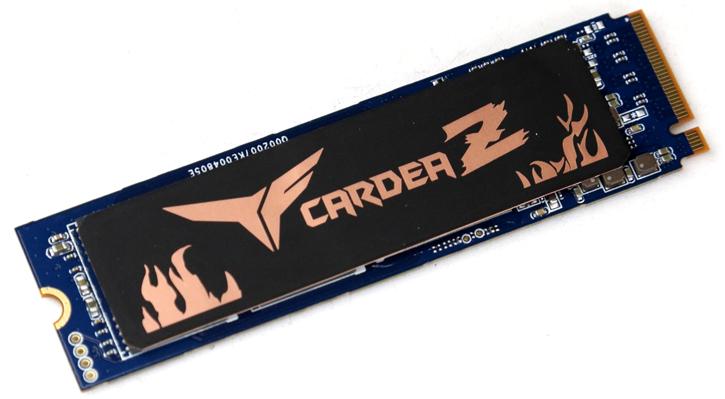Final Words & Conclusion
Final Words & Conclusion
Personally I think the smaller names in the industry like Team Group are a bit under appreciated, they offer products at market competitive prices, yet most of you guys only look at a product when the name starts with that capital S. Once again Team Group offers an incredibly lovely product with the new CARDEA Zero M.2. series. And they offer it it a notch under competing prices. This 240 GB version sits at roughly 100 Euros with the 480 GB model at just over 200 euros and that's just over 40 cents per GB for an NVMe MLC written SSD that easily passes the 2 GB/sec ranges in writes and 1 GB/sec ranges when writing. The Cardea Z shares a lot of the DNA the regular Cardea had. it has the same controller, however newer revision Toshiba 15nm NAND was used making it a notch faster. Also that big heatsink is gone, and Team Group now makes used of a copper enforced plate with sticky adhesive to even out heat coming mostly from the controller. At heavy workloads the controller reaches ~65 degrees C, so that is fine really and will prevent it from throttling down in performance. Performance wise the CARDEA Zero offers as advertised. It won't kick the 960 series proverbial toosh but it certainly is a fast device, especially when compared to regular SATA3 SSDs you nearly will have quadrupled performance (depending on the workload). Remember, to fully utilize the performance that is offered for NVMe you need a supporting infrastructure and this a motherboard with PCI Express Gen. 3 x4 interface and NVMe ready BIOS to fully utilize the bandwidth this product needs. NVMe based storage is one the most exciting technologies that we have been following develop closely over the past few years was obviously the development curve of NAND flash based storage technology. We moved from a "blistering fast" 100 MB/sec towards numbers that are 20 to 30 fold of that. Next to that prices have been coming down, reliability has been top notch and ever so importantly volume sizes have moved upwards to a level where now 500 GB to 1 TB SSDs are getting a norm slowly. The current new mainstream however is roughly 480 and 512 GB which offers a nice balance in between performance and value.
Performance
Overall these T-FORCE CARDEA Zero, and pretty much any, new M.2. storage units are fast, really fast even. Unfortunately they get trumped by the competition with that capital S in the name in absolute numbers, so while you are 4 maybe 5x as fast as a regular SSD, in the M.2 NVMe line it is in the lower ranking (overall). That doesn't mean we can measure full 2,600 MB/sec speeds or ~1,500 MB/s writes, it's just that the application software and workload needs to match a certain optimal state to reproduce these numbers. IOPS performance is very good, easily upwards to 200K reads and passing 150K on writes. This SSD writes and reads serious amounts of tiny files in a very fast fashion. We stated it before though, IOPS is not something you as a consumer should worry about too much unless you are doing a lot of database related work or create similar workloads on your PC, but this SSD certainly ranks high within this aspect. Trace testing - we feel that one of the best tests in our entire benchmark suite is PCMark. This is a trace test and can emulate what you guys do on your PC but then multiplied by a factor of 100, this test puts more focus on read performance opposed to writing though. The outcome of the results with the T-FORCE CARDEA M.2. (within the M.2 NVMe category) is good for an M2 NVMe product. Sustained read / write performance, again excellent and as advertised. Read performance in particular leads and is top ranking. Overall the series is impressive. Zoom in at both IOPS and trace performance and you'll notice that the SSD can manage serious workloads without breaking so much as a drop of sweat. So whether you write lots of small files, copy big MKV movies or do it all together, this M.2 NVMe SSD remains a top dog on all fronts.
Overall NAND Storage Usage
Any SSD is enjoyable, very much so. If you put a drive like this into your compatible PC, you'll have no idea what is about to hit you. We very much enjoy the grand sustained performance of this SSD series; if you copy a great amount of compressed data, then the unit will perform very fast in performance. Make no mistake, replacing a HDD with an SSD in your PC eliminates the random access lag of the HDD head, it is no longer mechanical. That combined with the performance SATA3 / M.2 / mSATA offers these days is simply a massive difference and probably the best upgrade you can make for your computer anno 2017.
Concluding
The Team Group T-FORCE CARDEA M.2 Zero is a great and fun M2 SSD. If you can spot it at the right price (roughly 109 bucks for the 240 GB and 200 bucks for the 480GB version) then we can definitely recommend it. It needs to be at that price level as otherwise the Samsung 960 EVO gets in the way. Don't forget, this SSD uses MLC NAND and the endurance is jus stellar, as Team Group will give you a 3-year warranty period with that endurance of 670 terabytes written for the 480GB model and our tested smaller 240 GB model can still manage a 335 Terabyte written. Compared to a 'regular' SATA3 SSD the numbers that these NVMe M.2 units produce are obviously staggering and as such impressive, but sure it's also relative. Keep in mind, going from a HDD towards an SSD made a huge difference. Going from a fast SATA3 SSD towards NVMe M.2 again is a faster step, but admittedly a far less less to notice one, as a regular SSD is already loading your data in a split second. Access times with HDDs always have been the biggest bottleneck, that mechanical head positioning itself on the platters was eliminated. With the introduction of SSD that massive latency issue was completely killed off, and that's where 90% of the performance benefit was found. So the big question remains how fast do these SSDs really need to be ? It is a discussion that will be interesting to see in the coming years. Honestly I think the trend will be NVMe with more capacity, 99.999% reliability and endurance (TB Written) as main factors being decisive. So in that respect, the SSD series is impressive seen from a SATA3 SSD. You will (give or take) quadruple your read performance over that regular SATA3 SSD. For writes that is double to triple the performance of today's SATA3 solutions. Among the M.2 NVMe competition however this is a more difficult to position product price and perf wise. We cannot ignore one fact though, Samsung dominates the NVMe space, there's just no doubt about it and they are just tough to beat with their tremendous R&D and budgets tied to that. The new Cardeo Zero series seriously boost your storage performance to new levels if you come from a normal SSD or even HDD. The new model now comes in a proper design (albeit a black PCB would have been really nice). The copper heat-plate helps a bit on stress temps.It's a good SSD with proper MLC NAND and a great TBW value. For a brand like Team Group to battle the big guns like Crucial/Micron and Samsung it however is a difficulty task to achieve. It's good and solid product, but in the end pricing needs to be really competitive to make a substantial enough difference to that competition. Hardware and performance wise we can most certainly recommend the new Cardea Zero M2 SSDs.
Recommended Downloads



